For small teams, managing a knowledge base (KB) efficiently is critical to improving collaboration, documentation, and internal communication. SSO serves as an advantage enabling team members to access the knowledge base using a single set of credentials, eliminating the need to remember multiple passwords and simplifying the user experience.
According to research by Yubico and Ponemon Institute, employees spend an average of 12.6 minutes each week dealing with password problems. SSO integration eliminates these friction points while strengthening security protocols.
In this article, we’ve carefully curated the best free KB platforms that support SSO integration, allowing small teams effortlessly maintain control over user permissions.
How to understand this guide
We’ve selected knowledge base platforms based on the following important metrics:
- SSO integration: The ability to integrate with SSO providers like Google, Microsoft, or custom SSO solutions.
- Ease of use: How user-friendly and intuitive the platform is for small teams with limited technical resources.
- Customization: The flexibility of the platform to fit your team’s branding and organizational structure.
- Scalability: While the focus is on small teams, we considered platforms that can grow with your team.
- Security: The platform’s adherence to security standards, particularly regarding SSO and data protection.
The platforms featured below offer a blend of simplicity and powerful features for small teams looking to implement SSO and easily manage their knowledge bases.
How SSO makes a difference for small teams
Implementing Single Sign-On (SSO) for a knowledge base is especially useful for small teams because:
- Improved user experience: No need to manage multiple passwords, improving team efficiency.
- Enhanced security: SSO allows centralized user management, reducing the chances of unauthorized access.
- Time savings: Easy access across platforms, leading to fewer login issues and support requests.
- Control over access: Centralized control over who has access to what content, ensuring better document management.
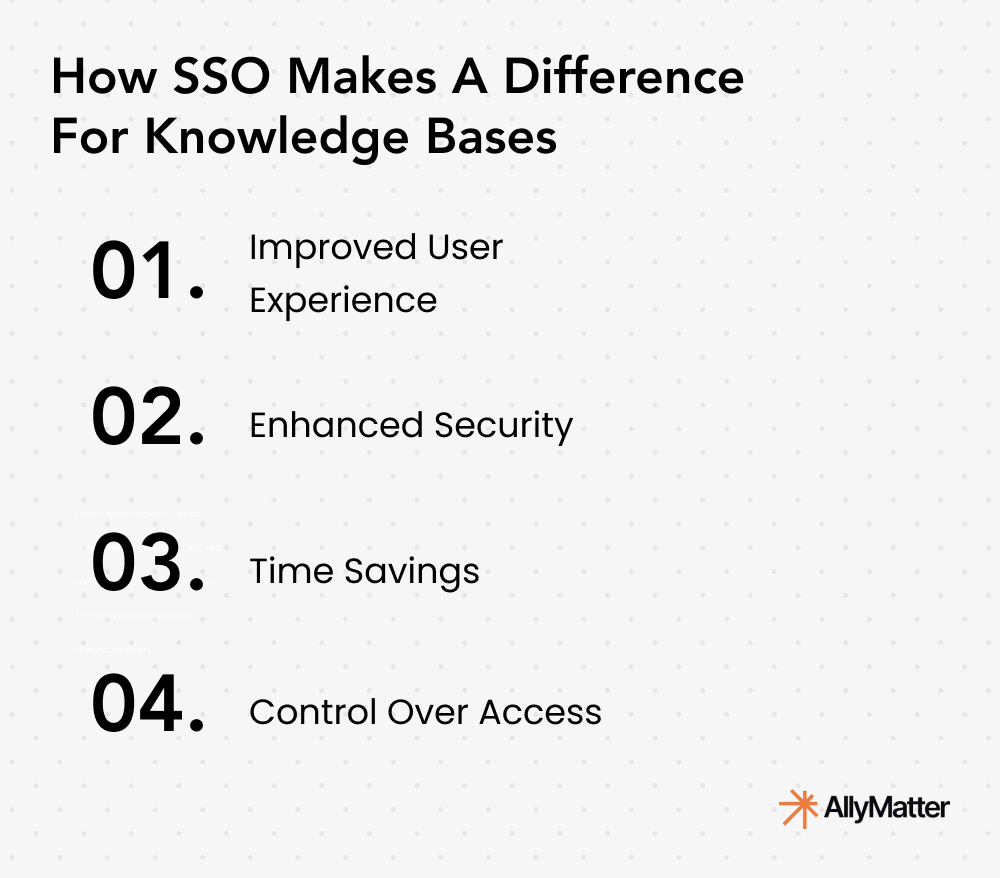
Consider Maria, an operations manager at a 50-person company, who watched her team struggle with accessing their process documentation. Team members frequently requested password resets for their knowledge base, disrupting workflow during critical project phases. After implementing SSO through their existing Microsoft Azure AD, employees could seamlessly access operational procedures using their company credentials, eliminating authentication delays and improving process adherence.
Popular SSO providers
- Google Workspace: Offers seamless SSO integration with apps like Gmail, Drive, and Google Meet.
- Okta: An enterprise-level identity management provider that offers a range of SSO options, including SAML, OAuth, and OpenID.
- Microsoft Azure AD: A cloud-based identity management service that supports SSO for Microsoft 365, as well as other third-party applications.
- Auth0: A flexible identity provider that supports various SSO standards (including SAML and OAuth) for both small teams and large enterprises.
BookStack
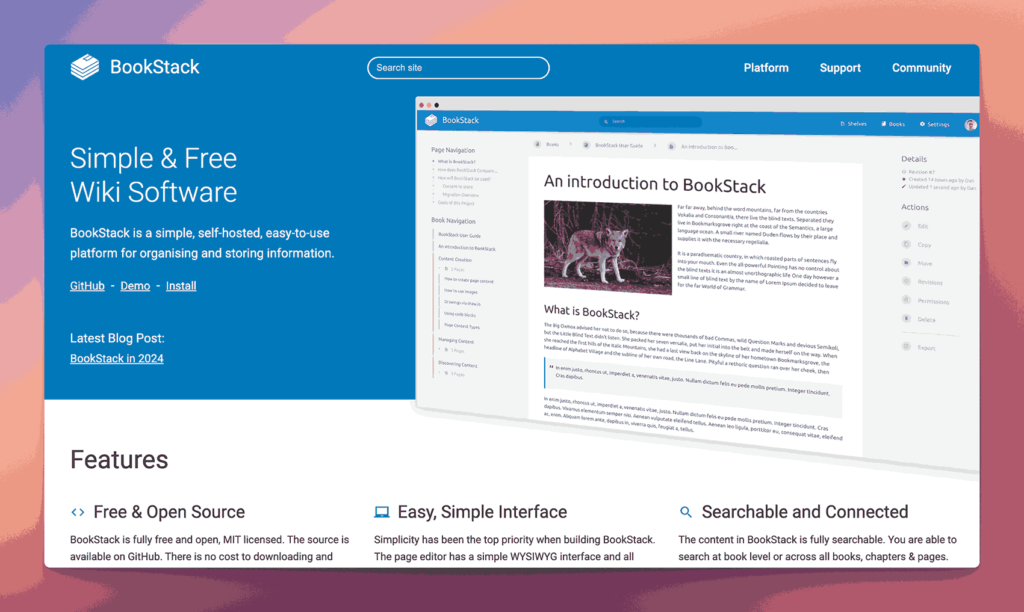
BookStack is an open-source knowledge base that uses a simple book-like structure, making it easy for teams to organize and navigate their content.
Key information:
- GitHub, Google, Slack, and AzureAD SSO options are free.
- Okta, SAML2, and LDAP are enterprise-level solutions, require a paid plan.
Why you might like it:
- Simple and intuitive interface that’s easy for small teams to adopt.
- SSO support via OAuth2 and LDAP, making it easy to integrate with existing authentication systems.
- Fully customizable with themes and branding options.
- Open-source and free, giving you full control over the platform.
Potential considerations:
- Needs some technical expertise to set up and manage.
- Lacks advanced search functionality compared to some other platforms.
Slab
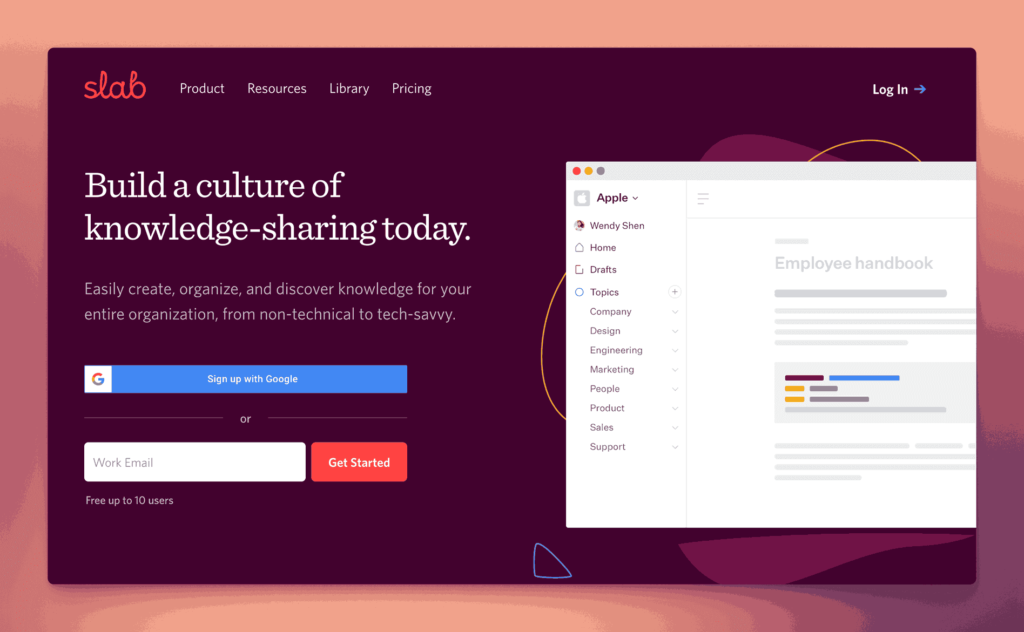
Slab is a knowledge base software designed for internal documentation, and while it’s not traditionally open-source, it offers a free tier and SSO integration via Google and other providers.
Key information:
- Supports Google workspace or Slack SSO in the free plan.
- SAML-based SSO require a business or enterprise subscription
Why you might like it:
- Clean, modern interface that’s easy to use and intuitive.
- Excellent search capabilities to quickly find the information you need.
- Free tier available, making it cost-effective for small teams.
Potential considerations:
- The free version has limitations on features like advanced customization.
- Limited to Google SSO unless you opt for a paid plan.
- SAML-based SSO (Okta, OneLogin, or Azure AD) and SCIM provisioning with Okta integration for higher-tier plans
Whale
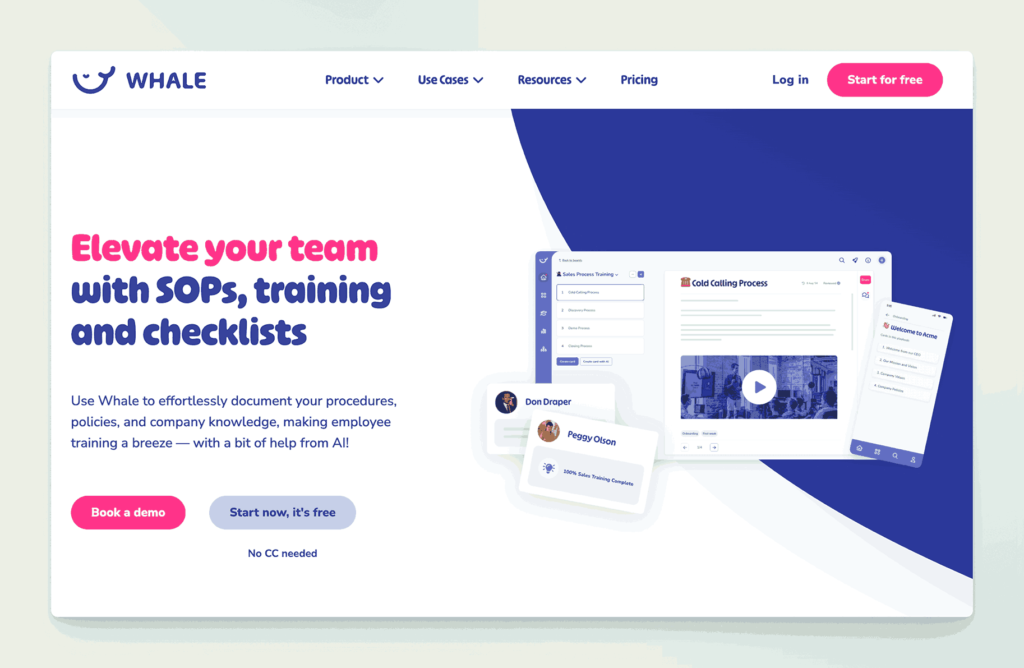
Whale is a knowledge-sharing platform designed to help teams create and distribute interactive onboarding and training materials. It allows organizations to centralize and streamline knowledge in a visual, engaging way.
Key information:
- Supports Google and Microsoft Single Sign-On (SSO) on the free tier.
Why you might like it:
- Easy-to-use interface with drag-and-drop features
- Centralized knowledge base
- Robust analytics to track employee engagement with content
Potential considerations:
- Limited customization options in the free version.
- Some advanced features, like integrations, are only available in paid plans.
- May not be suitable for highly technical or complex documentation needs.
- The learning curve for creating interactive content might be steep for some users.
Outline
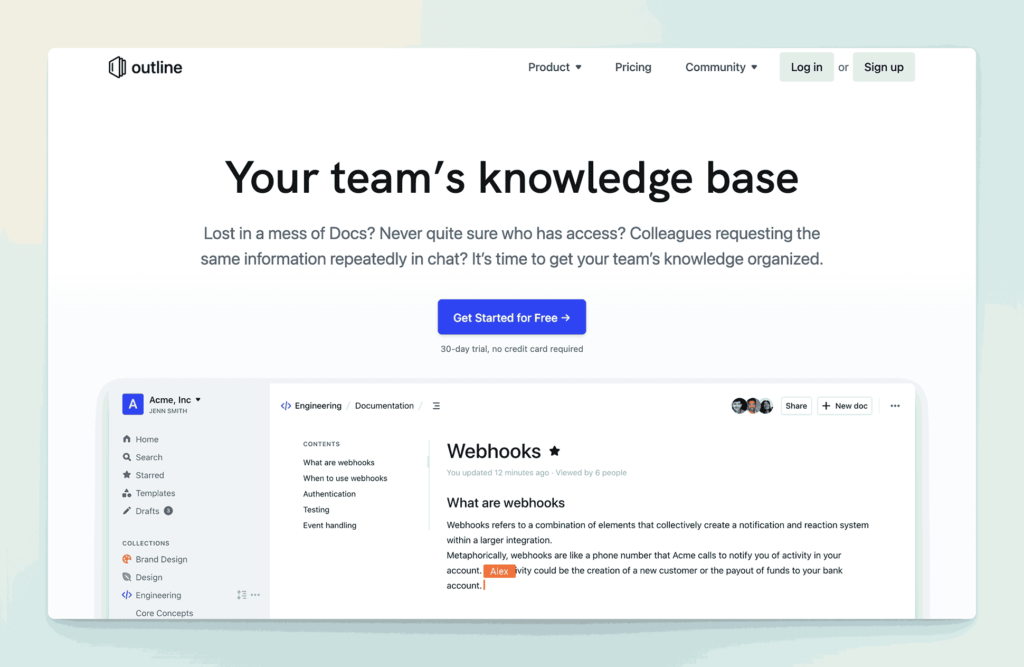
Outline is a modern knowledge management platform designed for teams to create, organize, and share documentation effortlessly. It focuses on simplicity, collaboration, and flexibility for both small and large teams.
Key information:
- Supports Single Sign-On (SSO) in the free community edition but needs to be self-hosted.
Why you might like it:
- Clean, user-friendly interface that requires no additional effort for onboarding
- Supports real-time collaboration
- Advanced document categorization and search capabilities
- Integration with popular tools like Slack and Google Drive
Potential considerations:
- Advanced features are only available in the paid plans
- Limited customization options for those looking for more complex setups.
- Not as feature-rich as some larger enterprise-level knowledge management systems.
GitBook
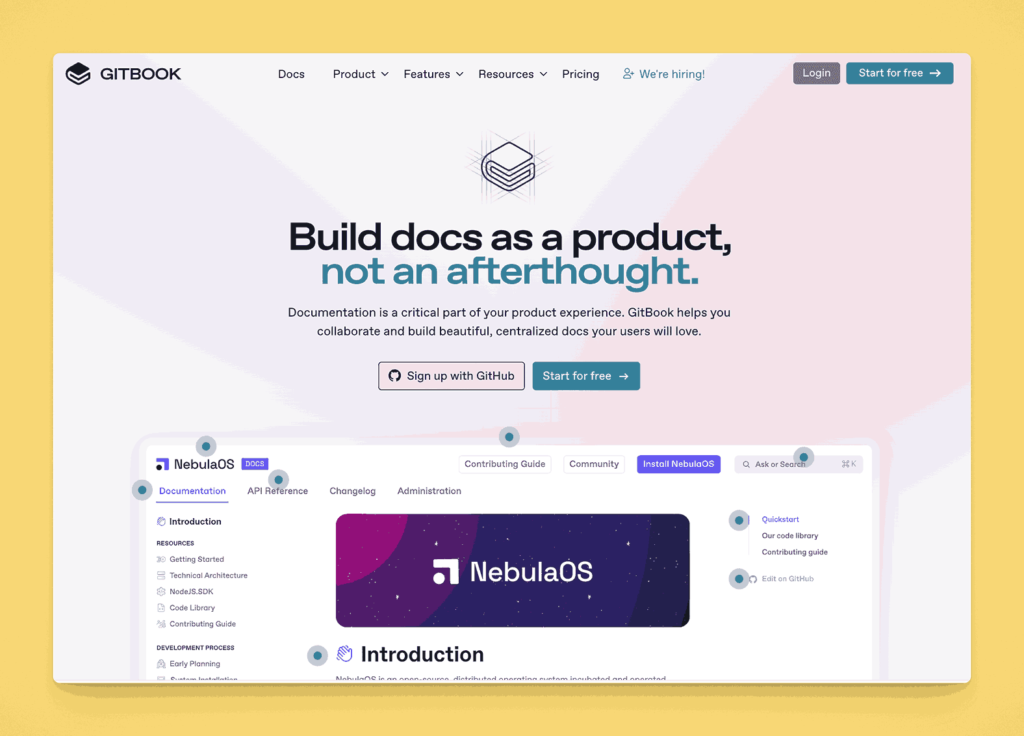
GitBook is a collaborative knowledge management and documentation platform designed for teams to create, organize, and share content. It is ideal for developers and teams who need a simple yet powerful way to document projects.
Key information:
- Supports Google/email domain SSO in the free plan.
- SAML SSO only available for enterprise-tier users.
Why you might like it:
- Simple and clean interface for minimal onboarding
- Allows real-time collaboration
- Integration with GitHub for seamless version control and content updates.
- Great for tech teams, as it supports Markdown
Potential considerations:
- Limited customization options in the free plan, especially for design and features.
- Advanced features like custom domains and analytics are only available only in paid plans.
- More focused on technical documentation, may not suit non-technical teams.
- Might require familiarity with Git and version control for optimal use.
Selecting the right SSO knowledge base platform
Choosing the right SSO-ready knowledge base platform is key for small teams looking to enhance their documentation and improve user experience. These free platforms provide essential SSO functionality for small teams beginning their knowledge management journey without additional overhead. By considering your team’s needs and technical expertise, you can find the perfect solution to streamline knowledge sharing and security.
AllyMatter: Building beyond basic SSO integration
While free SSO knowledge base platforms address fundamental authentication needs, growing teams often discover limitations in advanced functionality and customization options. These platforms typically restrict enterprise-grade features like granular access controls, advanced analytics, and sophisticated approval workflows to paid tiers.
AllyMatter provides comprehensive knowledge management with flexible SSO integration that supports both OAuth and SAML protocols. The platform’s role-based access control ensures team members see relevant documentation while maintaining security standards that scale with your organization.
Beyond authentication, AllyMatter offers intelligent document organization through smart tags and metadata search, collaborative editing with version control, and complete audit trails for compliance requirements. For teams ready to move beyond basic documentation storage toward strategic knowledge management, AllyMatter delivers enterprise capabilities without the complexity.
Ready to enhance your team’s knowledge management with advanced SSO capabilities and enterprise-grade features? Join AllyMatter’s waitlist.
Frequently asked questions
What is the difference between OAuth and SAML for knowledge base SSO?
OAuth works well for small teams using providers like Google or Microsoft, offering simple setup and user-friendly authentication. SAML provides more advanced enterprise features with greater security controls but requires additional technical expertise to configure properly.
How does SSO improve knowledge base security for small teams?
SSO eliminates weak password practices by centralizing authentication through trusted identity providers. This reduces security risks from password reuse, provides administrators with centralized access control, and creates detailed audit trails for user activity.
Can free SSO knowledge bases support team growth?
Free plans typically include basic SSO functionality but limit advanced features like custom domains, detailed analytics, and enterprise integrations. Most growing teams eventually need paid plans to access full SSO capabilities and administrative controls.
What happens if our SSO provider experiences downtime?
Quality knowledge base platforms offer backup authentication methods or emergency access procedures. However, free plans may have limited support options, making it important to understand each platform’s contingency procedures before implementation.
How do we migrate from individual accounts to SSO authentication?
Start by configuring SSO with your identity provider, then provide team training on the new login process. Most platforms support hybrid authentication during transition periods, allowing gradual migration before enforcing SSO-only access.


